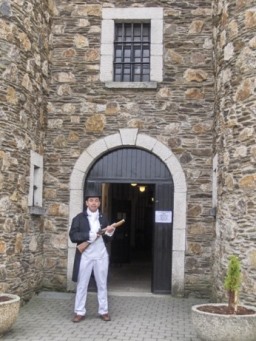- Home ›
- Irish Genealogy - Insight features ›
- Wicklow Family History Centre
The Wicklow Family History Centre
Located in the county town of the Garden of Ireland, Wicklow Family History Centre was recently let out of jail. Quite literally.
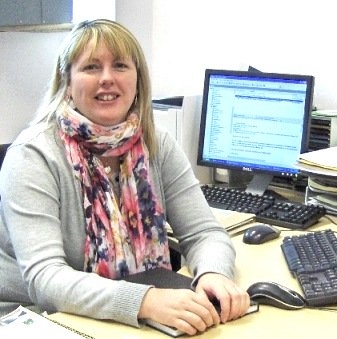 Catherine Wright is Archivist of Wicklow Archives and Genealogist at the Wicklow Family History Centre.
Catherine Wright is Archivist of Wicklow Archives and Genealogist at the Wicklow Family History Centre.After many years operating from
offices within the nearby 18th-century Wicklow Gaol, the genealogy research service
has moved to rather more modern accommodation in the County Council complex on the edge of town*. It's been a very positive step,
according to Genealogist and Archivist Catherine Wright.
"Unusually, Wicklow's Family History Centre is directly operated by the County Council," she explains. "Being sited at the heart of the Council, where funds originate, automatically gives the Centre greater prominence and should ensure the long term protection and preservation of our records."
The issue of protecting records is dear to archivists the world over but it is particularly poignant in Ireland which suffered such appalling loss of documentery heritage in the 1922 PRO fire.
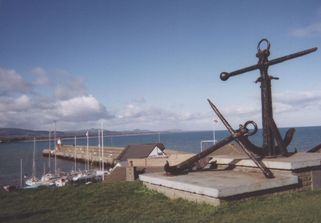 View over Wicklow Harbour
View over Wicklow HarbourWicklow, however, is an excellent example of why the urban myth that ALL the records were destroyed in The Fire really needs to be scotched. Like much of the east coast, it is a county that remains quite rich in records.
Average start dates are 1800-1810 for Roman Catholic baptism registers and 1810-1820 for marriages. Some go back to 1795. But there are several anomalies.
Registers for Kilbride & Barndarrig parish, for example, date from 1820 before suffering a gaping hole between 1838 to 1858.
Church of Ireland (CoI) records generally start a lot earlier. Some parishes – Bray, Delgany and Wicklow ‐ date to the 1660s with a few gaps along the way. The most significant entries on the missing list are for Derrylosary, in the Glendalough area, and Arklow where CoI registers have not survived.
* UPDATE
Since this interview with Catherine was first published, the Wicklow Family History Centre and Wicklow County Archives have moved to a brand-new purpose-built Wicklow Library and Archive in The Mall. See contact details below.
Other changes over the decade have seen Wicklow Archives' collection of Roman Catholic and Church of Ireland baptism and marriage records transcribed and uploaded to RootsIreland.ie.
Church of Ireland burial records for 35 County Wicklow parishes were also uploaded in May 2020.
Images of the RC registers are free to browse at the National Library of Ireland's registers.nli.ie. They are organised by parish but not indexed.
CS/IGT
* UPDATE
Since
this interview with Catherine was first published, the Wicklow Family
History Centre and Wicklow County Archives have moved to a brand-new
purpose-built Wicklow Library and Archive in The Mall. See contact
details below.
Other changes over the decade have seen Wicklow Archives' collection of Roman Catholic and Church of Ireland baptism and marriage records transcribed and uploaded to RootsIreland.ie.
Church of Ireland burial records for 35 County Wicklow parishes were also uploaded in May 2020.
Images of the RC registers are free to browse at the National Library of Ireland's Registers site (registers.nli.ie), where they are organised by parish but not indexed.
CS/IGT
All registered CoI and RC baptisms can be searched via RootsIreland.ie, the searchable database of genealogical records run by the Irish Family History Federation (IFHF), which the Wicklow Centre joined two years ago.
Marriage records, which have already been transcribed, will be added this summer, and death registers will follow at some time in the future. (See Update box.)
Catherine is on the board of the IFHF and is highly enthusiastic about the relatively new online facility. "It's been a great success," she says. "The power of an all-island search is huge."
Roughly half of her enquiries arrive via the RootsIreland site. Generally, enquirers ask a direct question and she provides a simple one- or two-sentence reply.
"Surname spellings are a regular source of confusion for researchers. The query will say something along the lines of: I can't find records for my great grandfather John OToole. There's a John Toole in the right age group and parish, but I know he can't be my relative because we've always spelt our name OToole. I'll then email back to say that spelling variations should be ignored and, if all the other details are correct, John Toole is probably his ancestor.
"Researchers forget that our ancestors lived in very different times. Many were illiterate so simply didn't know how their name should be written. And even if they could read, for reasons of deference, respect or fear they would not readily point out to a clergyman, doctor or other figure of authority that they had spelt the name wrong."
Similarly, our ancestors had a different attitude to age. When you're living in great hardship, a year – any year – is a long year. So it's hardly surprising they genuinely didn't remember or care about their age statistic.
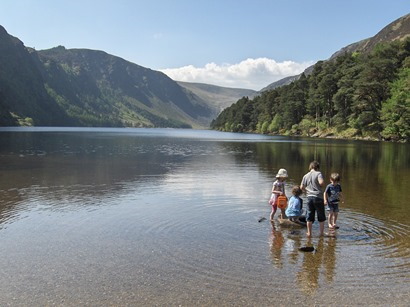 Paddling in Glendalough's Upper Lake.
Paddling in Glendalough's Upper Lake."For the majority, birthdays weren't marked or made memorable by cakes, candles and presents! Recorded ages, once out of the childhood range, should therefore be treated with caution.
Age and name issues are not unique to Wicklow family history research, of course. But some problems are. Often only a local genealogist can explain why the records are not divulging the expected information. There may be some quirk.
In addition to explaining quirks to people conducting their own research, Wicklow Family History Centre offers a full genealogy research service to those who may not want to piece together their own investigation or whose research has hit a brickwall. This service calls upon Catherine's local knowledge and her access to records, and she throws in a certain amount of experience-based instinct for good measure. This instinct typically comes into play in three areas: naming patterns within families, godparents and occupations.
She gives an example of a British client whose
recent ancestors had worked in mines in England's Newcastle area. He
understood there was some way-back connection to Wicklow but he knew nothing
more about his Irish roots. So I started the research in the townlands around
Avoca because it was a huge copper mining area. When it ceased production, many
local families migrated to North East England in search of work in coal mines.
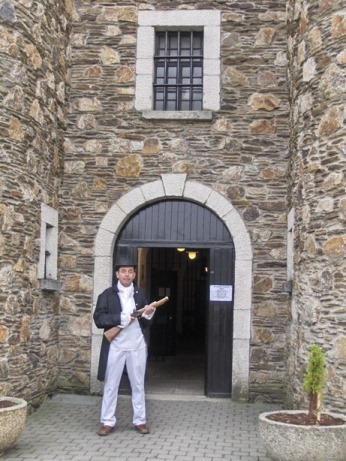 The Wicklow Family History Centre used to be inside the historic Wicklow Gaol, where the warden greeted all visitors with a blunderbuss in his arms!
The Wicklow Family History Centre used to be inside the historic Wicklow Gaol, where the warden greeted all visitors with a blunderbuss in his arms!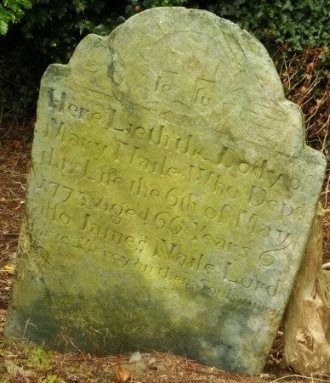 Old gravestone in County Wicklow's Three Mile Water burial ground. It reads 'In memory of Mary Naile who depd this life 6th of May 1773 aged 66 years. Also James Naile. Lord have mercy on their souls, Amen'.
Old gravestone in County Wicklow's Three Mile Water burial ground. It reads 'In memory of Mary Naile who depd this life 6th of May 1773 aged 66 years. Also James Naile. Lord have mercy on their souls, Amen'.Although gut reaction plays its part, Catherine aims to take a scientific and logical approach to every genealogy research project carried out by Wicklow Family History Centre.
"Generally, once I have one definite piece of information, the research follows a coherent path.
"I might, for example, pick up on godparents if we can't easily locate the child's mother or father, or I'll follow neighbours if we know the townland.
"Or I might look at the registers of a neighbouring parish, even where it means crossing a county border, if records in the most obvious location disclose nothing.
"Having ready access to sources obviously facilitates this wide approach.
 Old gravestone in County Wicklow's Three Mile Water burial ground. It reads 'In memory of Mary Naile who depd this life 6th of May 1773 aged 66 years. Also James Naile. Lord have mercy on their souls, Amen'.
Old gravestone in County Wicklow's Three Mile Water burial ground. It reads 'In memory of Mary Naile who depd this life 6th of May 1773 aged 66 years. Also James Naile. Lord have mercy on their souls, Amen'.Among the sources at her fingertips is a random collection of niche and local history publications produced by academics, local enthusiasts and other specialists. The indexes can be particularly useful because they list names of families or townlands mentioned in the text, and she can quickly flick through relevant ones to see what they reveal. She says such books often throw up a link that is so obscure it may not otherwise have been uncovered or accessed.
All such findings are then collated for inclusion in Catherines report. A single-volume report may cover several generations, and all findings are put into context together with the reasoning for her approach and her conclusions.
Contact details (correct at June 2024)
Wicklow Family History Centre
Wicklow County Archives,
The Mall,
Wicklow Town,
County Wicklow.
Tel: 00 353 (0)404 20100
Email: archives@wicklowcoco.ie
Website: Wicklow Family History Centre
Monday to Thursday: 10am-5pm. (Closed 1pm-2pm)
In addition to her genealogical and historical expertise, Catherine brings enormous enthusiasm to her role as the County Council's archivist and the manager of the Wicklow Family History Centre.
But while she undoubtedly loves her work, she can only stretch so far.
With the summer-long genealogy season looming, she issues a timely reminder to anyone who wanders down to the Gardens Centre: "If I'm here when people turn up, I'll see them and I'll always do whatever I can to help.
"But it's best to make an appointment. I'm only one person!
"Even better is to order your research before you visit, to give you the best chance of exploring your ancestors actual homeplaces when you arrive."
First published 5 March 2011
Checked for accuracy 9 January 2023
Where next?
- See more Insight features or find details of other Archives and Genealogy Centres in Ireland.
Where next?
- Contact details for the Wicklow Family History Centre below.
- See more Insight features or find details of other Archives and Genealogy Centres in Ireland.
Contact details (correct at June 2024)
Wicklow Family History Centre
Wicklow County Archives,
The Mall,
Wicklow Town,
County Wicklow.
Tel: 00 353 (0)404 20100
Email: archives@wicklowcoco.ie
Monday to Thursday: 10am-5pm. Closed for lunch 1-2pm.
Website: Wicklow Family History Centre

